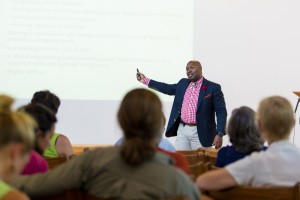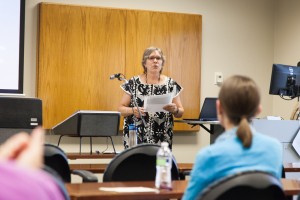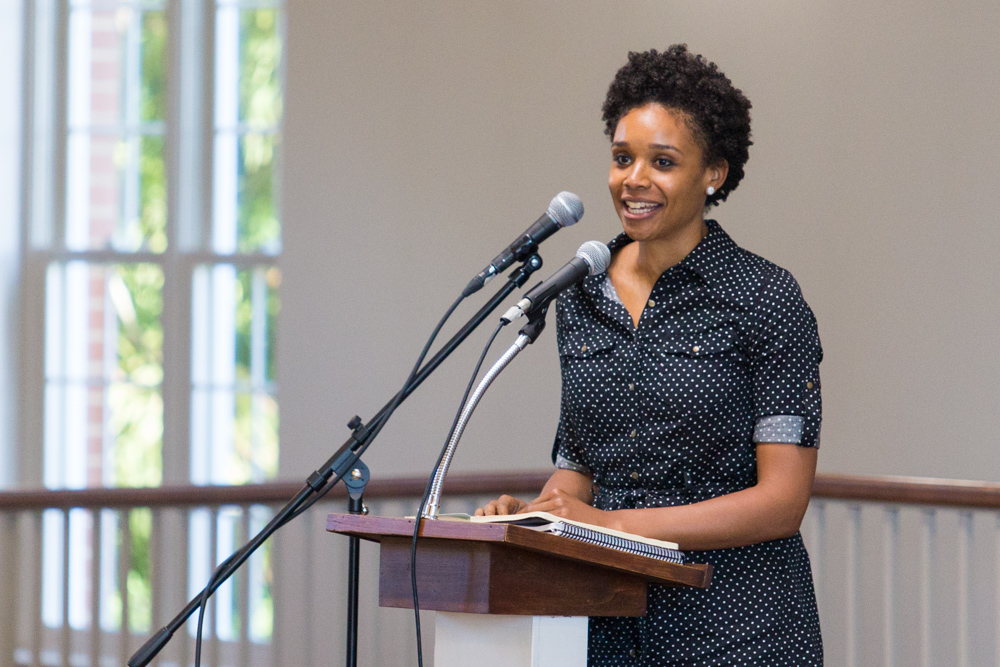“The last will be first and the first will be the last: This is what equality looks like, this is what justice is about.” Dr. Christena Cleveland, a social psychologist and theologian, invited Eastern Mennonite University faculty and staff into a new paradigm for welcoming and understanding diversity.
Cleveland, the keynote speaker at EMU’s annual faculty/staff conference, is associate professor of the practice of reconciliation at the Duke University Divinity School and author of Disunity in Christ: Discovering the Hidden Forces that Keep Us Apart (InterVarsity Press, 2013).
A sought-after speaker who was named one of “Five online shepherds to follow” by JET magazine, Cleveland remarked that the opportunity to speak at EMU was irresistible.
“As a reconciliation scholar and practitioner, how could I say no to EMU?” she said.
Inclusion, equity can be strengthened
The annual faculty/staff conference brings together approximately 350 members of the campus community at the start of the academic year for fellowship, worship and professional development. The theme of the Aug. 17-18 conference was “Embracing Diversity,” with diversity being defined in its various dimensions as race, faith, socio-economic background, gender, sexual orientation, political beliefs, physical abilities and other identities.
The topic was also informed by goals within the 2015-2020 EMU Strategic Plan “to recruit, develop, and retain diverse, effective faculty and staff.”

“This goal goes to heart of our mission and values as a university,” said Provost Fred Kniss, who chaired the planning committee. “Development of culturally competent educators and members of the campus community goes hand-in-hand with our mission of educating students to serve and lead in a global context. The conference helped us to continue discussion and assessment utilizing both our own significant resources and those provided by outside experts.”
In 2015, EMU’s traditional undergraduate population included a record-high 37 percent of students who are ethnic minorities or come from other countries. That number is up from 36 percent in 2014 and 29 percent in 2013.
“We have many strengths in this area,” Kniss said, noting the institution’s history of inclusion of African Americans, the required undergraduate cross-cultural experience, and a high percentage of faculty and staff who have lived and worked in other countries. “Our work in global peacebuilding and in restorative justice are a strong foundation to build upon, but we must be proactive in confronting and addressing questions of inequality and equity that challenge us as a community.”
Afternoon sessions included
- Cleveland on “Power and Place: Why Some Students Thrive and Others Don’t on Christian College Campuses”;
- Diversity Task Force chairs Susannah Lepley, director of multicultural and international student services, and Jane Ellen Reid, ombudsperson, about focus group research conducted in spring 2016;
- Professors Deanna Durham and David Evans, admissions counselor Londen Wheeler and graduate student Julian Turner, on “Black Lives Matter and White Fragility”;
- Professors Judy Mullet and Kim Brenneman on teaching and advising diverse students with mental health challenges:
- Professors David Brubaker and Roxy Allen Kioko on building inclusive organizational cultures;

Jane Ellen Reid, university omsbudswoman and co-chair of the Diversity Task Force. - EMU Lancaster Provost Mary Jensen, on Milton Bennett’s Developmental Model of Intercultural Sensitivity;
- Professor David Ford, of James Madison University, on “Difference and Civility: Building Resilient Responses to Intolerance.”
‘Do the work. Leave your turf. Listen.’
Cleveland began her address as a social psychologist, outlining why humans living in a pluralistic and complex world define themselves so fiercely within a group identity, and then moved into the theological realm. She asked how the privileged and the powerful can step away from that hierarchical space.
Cleveland, the daughter of church planters from California, pointed out that only 11 percent of Americans are raised by two college-educated parents. Acknowledging her own privilege — raised in a home committed to higher education and daily enrichment and educational experiences, she attended an elite East Coast boarding school and Dartmouth College. This upbringing led her to examine closely Jesus’s relationship to the oppressed and marginalized in a world that was “rife with inequality.”
She asked: “What would it look for me to empty myself of my power and my privilege in a way that Jesus did?”
Using two parables, she pointed out that Jesus did hard and radical work: he shifted attention, changed narratives and transposed power positions so that marginalized peoples moved into positions of power.
“Jesus didn’t say, ‘Figure it out. Jump up to the Trinity,’” she said, evoking laughter from the audience. “Do the work. Be last. Leave your turf. That will look different for every person. How do you leave your turf at EMU? How will you, the privileged, move from first to last? … So many of us have never been last so we don’t know what that looks like.”


Great article; great experience.
Eager for the podcast…
I had to miss it because of a family emergency that took me out of town. Definitely looking forward to the podcast!